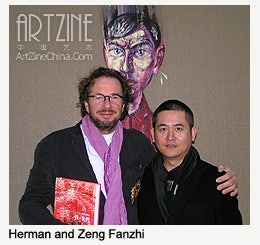Well-Known Collector Discusses Development Of Chinese Art World, Growing Scarcity Of Top-Level Works#

With the increasing numbers of Chinese art collectors, Western collectors -- who have virtually monopolized the Chinese art market for the last 30 years -- are finding it more difficult to get their hands on pieces by top Chinese contemporary artists. This week, ArtZine China spoke to well-known collector Herman Heinsbroek, who has built up an enviable collection of works by Chinese contemporary artists like Zhang Xiaogang, Zeng Fanzhi, Yue Minjun, Wang Guangyi and others since 2006.
An interesting aspect of this interview is that Heinsbroek remarks on the prices that work by top and emerging artists alike are fetching in the Chinese market, and the role that scarcity of high-quality works is playing in the prices that some artists -- like Zeng Fanzhi -- are fetching now. Though the global financial crisis took a bite out of prices of contemporary Chinese art, Heinsbroek's comments seem to echo the results of ArtTactic's recent survey, which called attention to the effect increased Chinese collecting has had on pricing, and which found that most respondents (70%) were confident that prices of contemporary Chinese art would get back to pre-crisis levels by late 2011.
ArtzineChina
: Please tell us how you got involved in collecting Chinese contemporary art and when?
Herman
: I have always been an art collector and two years ago, so only in the beginning of 2006, an art gallery owner I know in the Netherlands phoned me that he had a painting by Zhang Xiaogang for sale. If I was interested? I had never heard of Zhang but answered that I would like to see the work.
He asked a substantial sum of money for it.
The moment I saw the work I was struck by its beauty and the social/cultural impact it had on me. I like art that says something, that has some sort of political engagement. It told me about family ties in China and I also felt the pain people in China must have felt during the Mao-regime. It was very well painted. The eyes, the expression on the face. I was quite impressed.
You must not forget that to us in Europe, China had been closed for 50 years or so and only slowly after 1989 it became clear what really happened during the repressive communistic years. Here I saw a work by an artist that told me a lot in a very subtle way. I bought it on the spot and started to read about Chinese Contemporary Art and artists and searched the net.
...
Herman:
Collecting Contemporary Art from China is not easy if you have a small budget.Even the prices for young and totally unknown artists are going through the roof these days, everybody jumps on it and there is a lot of crap for sale.
When I have the time I visit art fairs, openings at well known and reliable art galleries, look at internet sites and of course I keep a close eye on what is happening at the auction houses.
Quite some of people in the international art world know me by now and that I am a serious collector. So they offer me pieces but one has to be careful. I see more and more fakes being offered by dark dealers.
I preferably buy from the artist directly (that is the best and most reliable provenance) but that unfortunately is not always possible anymore.
...
ArtzineChina:
How are the skyrocketing prices affecting you? Is it making you reluctant to collect, or more excited about collecting?
Herman:
The skyrocketing prices affect everyone but it is also exciting. It does not put me off. You simply have to be smarter than someone else to find bargains or good deals.I think that the big names will become even far more expensive than they are now. Besides there is the new generation. Although they also tend to be too expensive, but you can negotiate strongly.